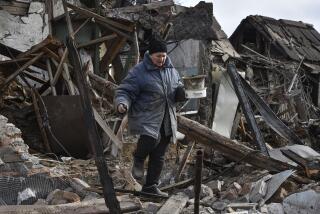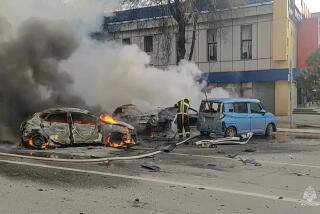Air Power Alone Is Powerless in This War : Bosnia: The ‘surgical air strikes’ that many are calling for would have little impact on the Serbs’ irregular forces.
With politicians from Bill Clinton to Margaret Thatcher demanding instant justice for Serbia’s crimes, the use of Western air power has become a central issue in the Balkan crisis. Since June, editorials have proposed using air power to roll back Serbian forces, and now the Bosnian government has asked for air support. But air power alone cannot restore the integrity of Bosnia.
Two questions are at the heart of this issue: What are the general conditions under which air attack can coerce states to abandon territorial goals, and, are these conditions present in the Balkans?
Conventional air attacks on civilians do not cause states to abandon important national interests. Air power slaughtered British, German and Japanese civilians in World War II; threatened Egyptian civilians in the 1970 “war of attrition” with Israel, and depopulated large parts of Afghanistan in the 1980s. Yet civilian losses did not cause any of these nations to surrender.
A Western air campaign would not go after civilians directly, but would target key sectors of the Serbian economy vital to civilians--water, electric power and food networks. This is unlikely to persuade Serbs to abandon their positions--and their million fellow Serbs--in Bosnia. Bosnian Serbs are even less likely to give in, since they face the risk of a Muslim backlash after recent atrocities.
Even if air strikes did destabilize the Serbian government, matters may grow worse, not better. The party that finished second in the June elections was the ultra-nationalist Serbian Radical Party. They probably would support even more extreme “ethnic cleansing” than the current regime.
Air strikes on military targets can have significant coercive impact, but only if they dramatically reduce the opponent’s hopes for success on the battlefield. Simply destroying some enemy forces is not enough, as the Vietnam War illustrated. During the 1960s, North Vietnam pursued a guerrilla war strategy with such minimal logistic requirements that air power could not seriously hinder it. By the early 1970s, Hanoi had shifted to a conventional offensive strategy that U.S. air power could and did bring to a halt. Thus, the success or failure of coercive bombing depends not only on the bombing strategy, but also on the strategy employed by the opponent.
With Serbia, therefore, the key is to undermine its military strategy for holding the territory it now occupies, the backbone of which is the local Serb militia force of about 50,000 irregulars.
The West could attack the Serbian Army, even though it is no longer fighting in Bosnia, threatening its ability to hold Serbian-seized enclaves in Croatia and Kosovo. This is unlikely to compel retreat from Bosnia, because the Serbian goal is to protect ethnic Serbs in all three regions; they will not sacrifice one to save the others. Even if army support for the Serb militias in Bosnia were withdrawn, they are strong enough, and the Muslims weak enough, that they could continue to hold their positions unassisted.
Interdicting supplies by blowing up bridges between Bosnia and Serbia would not be effective either. The Serb militias are a local force with few heavy weapons and their supply requirements are minimal. Also, the guerrillas have access to numerous hidden weapons caches left over from Tito’s preparations for an “All Peoples’ ” war in case of a Soviet invasion.
Air power could try to hunt down the Serbian irregulars, in what would amount to a massive counter-insurgency campaign throughout the length and breadth of Bosnia. This would entail continuous heavy combat patrols, using hundreds of fixed-wing aircraft and helicopters. Some Western personnel would have to be on the ground to serve as forward air controllers and liaison with Muslim forces; there would be some casualties.
This strategy could silence the Serbs’ few tanks and heavy guns, but it would have much less effect on the militias’ main strength, which consists of easily concealed light mortars and irregular infantry. Air power could be combined with Western military aid to the Bosnian Muslims, enabling them to take the offensive. However, air power could play only a limited role in this campaign, because it would be impossible to hit defending Serb forces, which would be dug-in in towns, without risking heavy civilian casualties; the Muslims would have to do most of the work.
Assisting Muslims in recapturing some originally Muslim areas of Bosnia is a feasible goal. If the Serbs are convinced that their military strategy for holding Muslim towns cannot succeed, they may concede them. This would require an ongoing commitment to help defend retaken areas, not a single-shot campaign.
However, trying to restore Bosnia’s original territorial integrity would be extremely dangerous. A Muslim advance into the Serb-populated areas of Bosnia would unleash further violence because Serbs would resist the twin specters of Muslim rule and war-crimes trials. Worse, air power would not protect the thousands of Muslims held in Serbian camps; in fact, air strikes probably would provoke atrocities against these hostages.
In short, air power is least effective in a civil war. If diplomacy fails, only a costly ground campaign can restore Bosnia.










